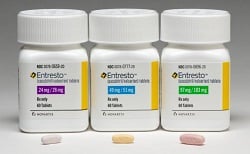Novartis ($NVS) launched its new heart failure drug Entresto under a big spotlight. Market-watchers were predicting a quick zero-to-blockbuster hit, and Novartis execs said the drug might be the company's biggest launch ever.
 But that's not the only reason why people are watching: Novartis turned up the brightness even more with a concerted effort to strike pay-for-performance deals with payers.
But that's not the only reason why people are watching: Novartis turned up the brightness even more with a concerted effort to strike pay-for-performance deals with payers.
Skeptics weren't convinced, but Novartis noted a couple of victories during its Q4 earnings call: The company had set up deals with two plans--which the company declined to name at the time--linking rebates to Entresto's results.
And now, the two payers have come forward to talk about the deals themselves. Cigna ($CI) and Aetna ($AET) have each announced "value-based" pricing arrangements with the drugmaker.
Cigna's payments to Novartis will depend on Entresto's results, the insurer said in a statement, with dollar amounts linked to the rate of hospitalization among patients on the med.
And as Reuters reports, Aetna said its deal with Novartis is based on the drug delivering real-world results similar to those seen in clinical trials.
During the earnings call, Novartis pharma chief David Epstein said the deals set a "fairly modest" base rebate which will rise or fall depending on the drug's performance. If Entresto helps the plan save money on hospitalization or other costs, the rebate goes down. If it doesn't, the rebate goes up.
 |
| Novartis' David Epstein |
"[W]e think that's going to become something that becomes more and more popular in the U.S. and around the world," Epstein said.
U.S. payers have appeared reluctant to sign onto the idea, with some top pharmacy benefits openly skeptical, including the outspoken Express Scripts ($ESRX) CMO Steve Miller. But Novartis CEO Joe Jimenez and Epstein have kept pushing, publicly touting the idea while negotiating behind the scenes. And in rolling out its news about the contract, Cigna called outcomes-based deals "a valuable tool" for improving patients' health and managing costs.
"Competitive drug prices are important, but equally so is ensuring that customers' medications are actually working as, or better than, expected," Cigna Pharmacy Management SVP Christopher Bradbury said in a statement, adding. "When pharmaceutical companies stand behind the performance of their drugs through these kinds of contracts, we can deliver the most value to Cigna's customers and clients for the money they are spending."
Other drugmakers are piloting their own outcomes-based contracts. Amgen ($AMGN), for one, has set up at least one performance pricing plan on its PCSK9 cholesterol drug Repatha; Harvard Pilgrim Health Care will pay rebates according to the drug's results in its patients, measured by cholesterol-level targets for particular patient groups.
The performance approach to pricing seems logical--even attractive--which is why these latest contracts aren't unprecedented. In England, the National Institute for Health and Care Excellence has set up a series of cost- and risk-sharing deals with drugmakers; most recently, it struck a deal with Johnson & Johnson's ($JNJ) Janssen unit to cover the hep C drug Olysio, paying for the drug only if patients fully respond within 12 weeks of treatment. Novartis itself has one performance-based deal on the multiple sclerosis drug Gilenya.
But in practice, such deals can be difficult to administer, and that's one reason why U.S. payers have been reluctant to make pay-for-performance arrangements on Entresto, Novartis has said. A U.K. government report found that the National Health Service had fallen short on clawing back rebates owed under its cost-sharing deals with drugmakers. And as Miller has pointed out, the U.S. health system even lacks the infrastructure to collect the right patient data on a broad basis.
- see the Cigna release
- get more from Reuters